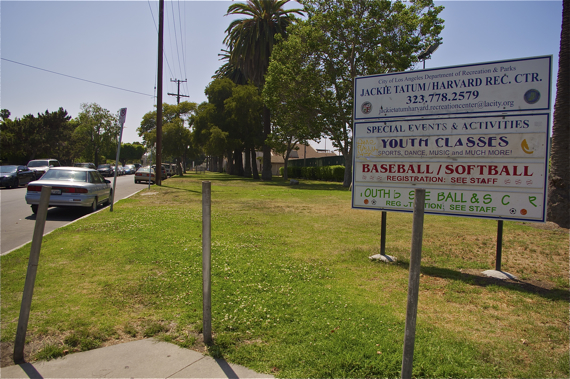
When people talk about park access, they usually are referring to whether or not people have a park near their homes.
In the case of the Jackie Tatum Harvard Recreation Center, you have a great park with some great new facilities in South L.A. -- a traditionally park-poor area -- but it isn't that easy to access.
The reasons for this are many.
The park, located at 62nd and Denker and has traditionally been a hangout of the Harvard Park Brims (Bloods) sets that run in the area.
As HPB territory is surrounded on all four sides by Crip sets, it has historically been somewhat embattled. Long-time residents all have stories of how active the area and, in particular, the park used to be, both as a place for gang members to party and where daytime shootings were not out of the ordinary.
While things have gotten better of late, gang members can still limit park access; they apparently even temporarily chased out workers putting in the new skate park there just a few years ago. And, the fact that it is a known gang hangout endangers non-gang members, too. In 2012, Patrick Carruthers, a beloved nineteen-year-old park volunteer with a learning disability was shot in the back and killed in a middle-of-the-day walk-up while listening to music on a picnic bench.
Some attempts to manage the problem have been made with the (overdue) installation of cameras around the park last year that are monitored by the LAPD's 77th Division. But, budget cuts have hurt the ability of parks in lower-income neighborhoods like this one to fill staff positions and offer classes to the community that might help keep youth engaged in healthy activities and out of trouble. And, because many in the area struggle financially, the park lacks the ability to charge fees for programs to cover some of their costs the way one in a wealthier community might be able to do.
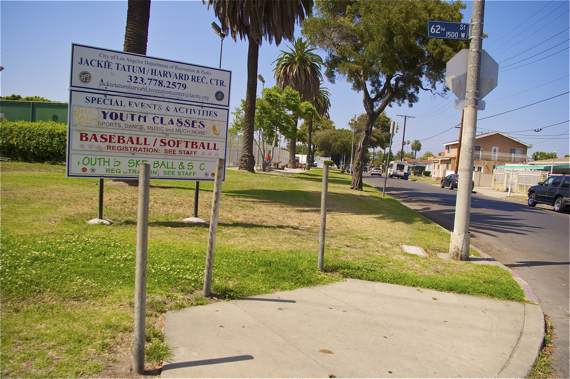
The other access issues should be more easily (and are long overdue to be) fixed.
While it may have nice tennis courts, indoor and outdoor basketball courts, an awesome water slide and aquatic center, several playing fields, beach volleyball pits, a playground for kids, and even horseshoe toss pits, if you're disabled, pushing kids in a stroller, or just want to take a stroll around the park, you're out of luck.
Somehow, the park has gone all this time without having sidewalks on three sides.
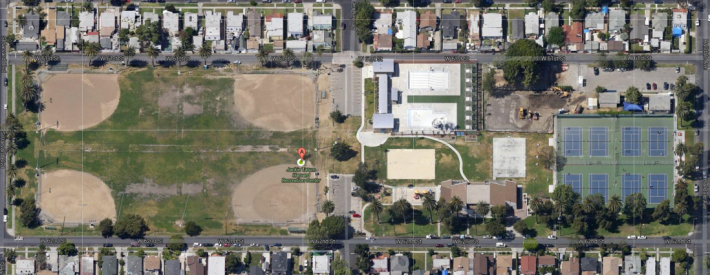
And, even where there are sidewalks, there are precious few curb cuts.
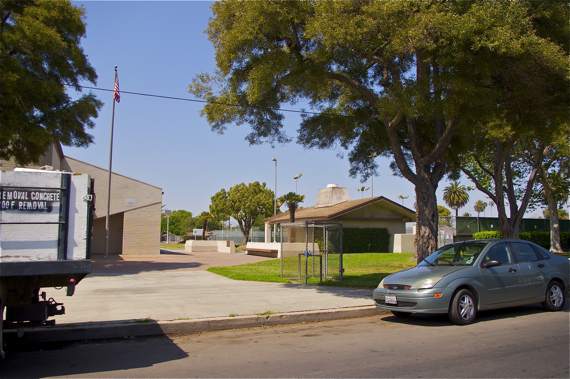
If you need a curb cut to access the facilities, you'll have to go in through the parking lots on 62nd or 61st streets.
And, although the park is undergoing upgrades at the moment, I was told that sidewalks are not part of the improvements.
The park will see the renovation of two of the four baseball diamonds and the re-purposing of the other two fields into a T-ball field and a multi-purpose athletic field. It will also receive new ADA-compliant bleachers, new chain-link fencing, new dugout awnings, a walking/jogging path, irrigation and landscaping, and the replacement and installation of a new electrical panel enclosure (For more on the improvements and budgeting, see here).
While those are welcome additions to the park, sadly, the fitness equipment Bureau of Engineering representatives thought might be going in after the skate park was built in 2011 are not among the improvements.
My observation of parks in South L.A. and elsewhere is that the popularity of such equipment with everyone from young adults to families helps to keep the park continually populated with a healthy mix of people, creating a more peaceful and welcoming environment.
The skate park has served that purpose, to a degree, now -- it is constantly packed with a diverse mix of youth from all over South L.A. So has the aquatic center and water slide (opened in 2009, with assistance from Kaiser Permanente), when it is open and bustling in the summer. But, in the off-seasons or during periods when there are no organized activities, much of the rest of the park can be awfully empty.
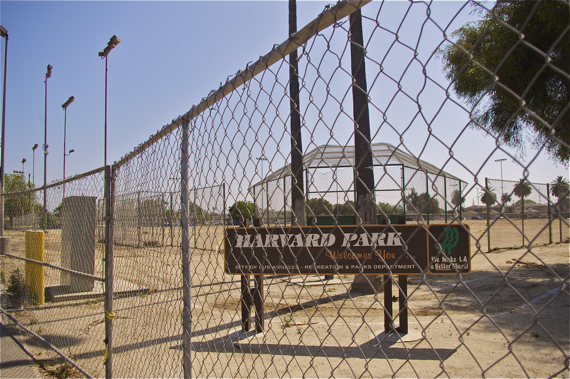
The recent renovations notwithstanding, the overall longer-term neglect of the park is unfortunate. Back in the day, Harvard Park was the home to professional baseball players Darryl Strawberry and Eric Davis. Even after making the big leagues, they would return to the community in the off-season to train, simultaneously nurturing the talents of local youth they hoped to give a leg up to in what they called The Program (The Program was the subject of the 2012 documentary on Harvard Park).
Old-timers taking in the sun yesterday mentioned there were other local heroes who also enjoyed offering kids free tennis lessons on weekend mornings.
Getting the kids proper equipment or back and forth to games was a struggle, they said, as those things were expensive. But, they appreciated the discipline and drive that a sport like tennis could give the youth and thought it was key to giving youth the tools to be successful in life.
If others from the community are willing to put in the effort to help out their fellow neighbors, it would seem the least the city could do would be to put in some sidewalks and make the park more accessible to those looking to take that positive path, no?





